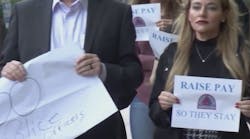Nov. 19--NEW HAVEN -- A judge Monday postponed a hearing on whether to temporarily bar new promotions in the Police Department because 10 African American police officers claim they were discriminated against when the last promotional list allegedly was allowed to expire prematurely.
In a brief hearing, the city and attorney John R. Williams agreed to delay the hearing date to Dec. 5 with city assurances, Williams said, that no actions on promotions would take place before then.
"We know the status quo is in place," said Williams.
The city, meanwhile, filed two legal motions, one objecting to the request for the temporary injunction and the other seeking to dismiss some of the plaintiffs in the case because, based on the city's math, they wouldn't have been eligible for promotion no matter whether the list was good for one or two years.
"There is no legal basis for an injunction," said Victor Bolden, the city's corporation counsel.
The fundamental argument by the 10 plaintiffs is straight forward, even if law behind it is more complex. The city tested for the rank of sergeant in 2009. All 10 took the test. The resulting promotional list was certified for one year and expired even if historically lists have been extended for a second year, which is allowed under civil service rules.
The officers claim they were denied promotion because they might otherwise have been promoted had the city followed its longstanding practice. They claim it was because of their race.
Williams has asserted the law behind this case is nearly identical to the Ricci vs DeStefano case from 2004, when 20 mainly white firefighters sued the city of New Haven after it threw out results from two promotional exams, citing concerns that too few blacks would advance. Fourteen of them won promotions and then and others won damages after a landmark case before the U.S. Supreme Court.
In the case of the 2009 sergeant test, concerns were raised that no Hispanics passed the test.
In newly filed documents, the city attempted to discount parallels between this lawsuit and Ricci, named after lead plaintiff Firefighter Frank Ricci.
Bolden saw a critical issue in the U.S. Supreme Court Ricci decision was that firefighters studied for and competed in the exam whose results were thrown out.
In the police case, the officers and detectives took the 2009 test, it was certified, and it expired and they waited until after a second test two years later to try to prevent promotions through an injuntcion.
The legal motion argued they filed for injunctive relief to late.
The lawsuit itself, however, was filed in 2011 before the new test was administered.
Lawyers for the city went on to make several other arguments: If the request wasn't too late, it certainly was too early since none of the plaintiffs who took the new test could know how they fared because the results haven't been released.
And even if the court were to find the injunction was filed in a timely manner, they would have other legal avenues for remedy.
The city went on to state that denying the injunction can't harm the plaintiffs but could harm the residents of New Haven and create "great hardship" for police.
"To allow the public safety of New Haven's residents to be addressed inadequately, while this lawsuit finishes its course, would work a great hardship on those who are serving the public...."
Williams discounted the arguments.
Williams said any monetary awards can't remedy any injustice. He has argued that if promotions were to proceed, spots that rightfully should belong to his clients could be filled by other people.
"There are arguments that the judge will consider in due course. Personally, I think the case is pretty straight forward," Williams said Monday.
More than a dozen police officers attended Monday's hearing. Ten officers are members of the suit in Superior Court and eight others are plaintiffs in a federal lawsuit making similar claims of violations of civil rights.
"Showing solidarity," one plaintiff in the federal suit, who is white, said as he entered state court.
As Williams met with his clients after the brief hearing, he said that a similar motion could be filed in federal court but doubted it would be heard in time or cause a reversal if the state judge ruled for the city.
While there is nothing to prevent a one judge from rendering a contradictory injunctive order from another, it rarely happens, he said.
The officers, he said, will likely get one bite of the apple.
Copyright 2012 - New Haven Register, Conn.


